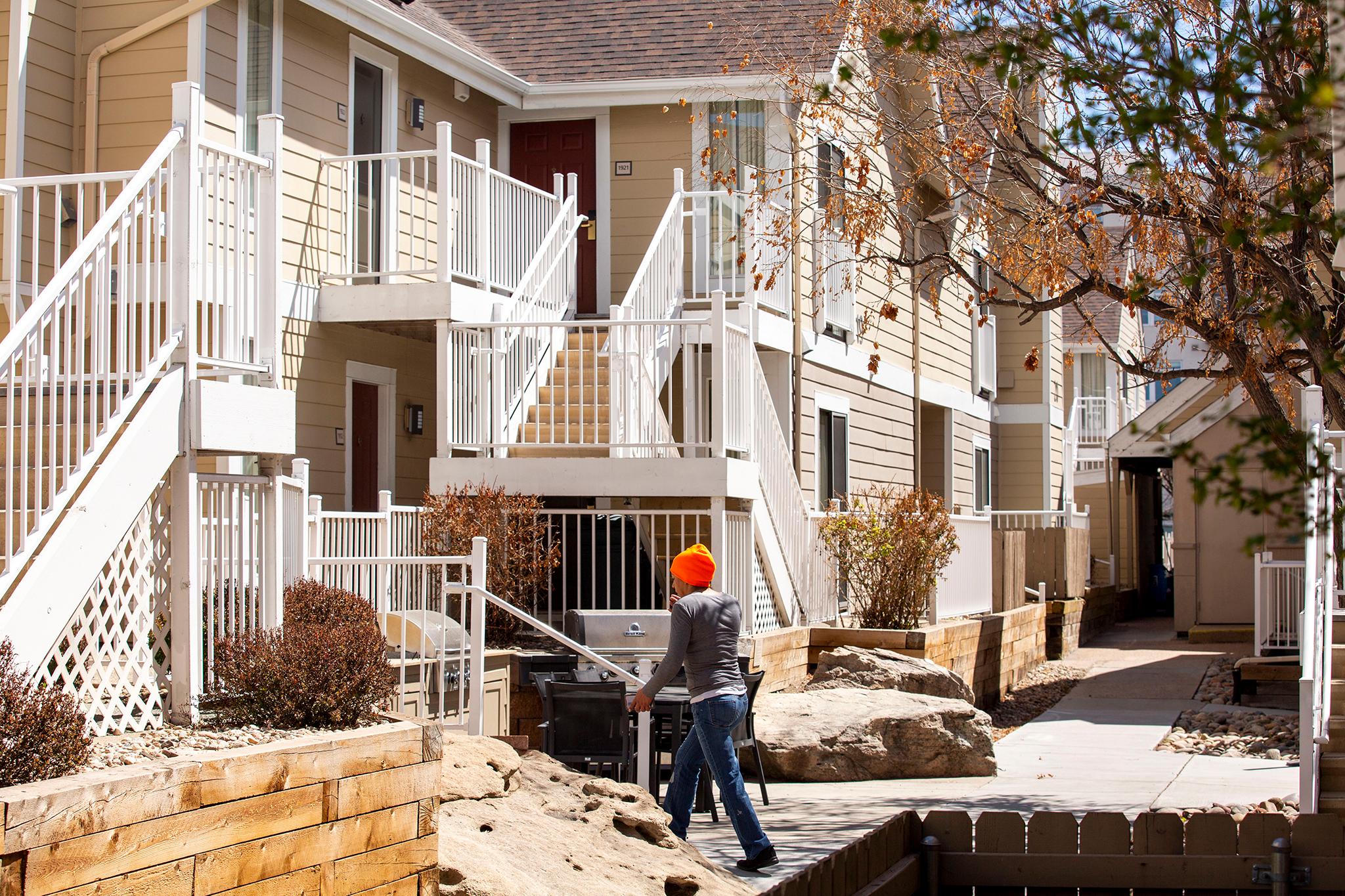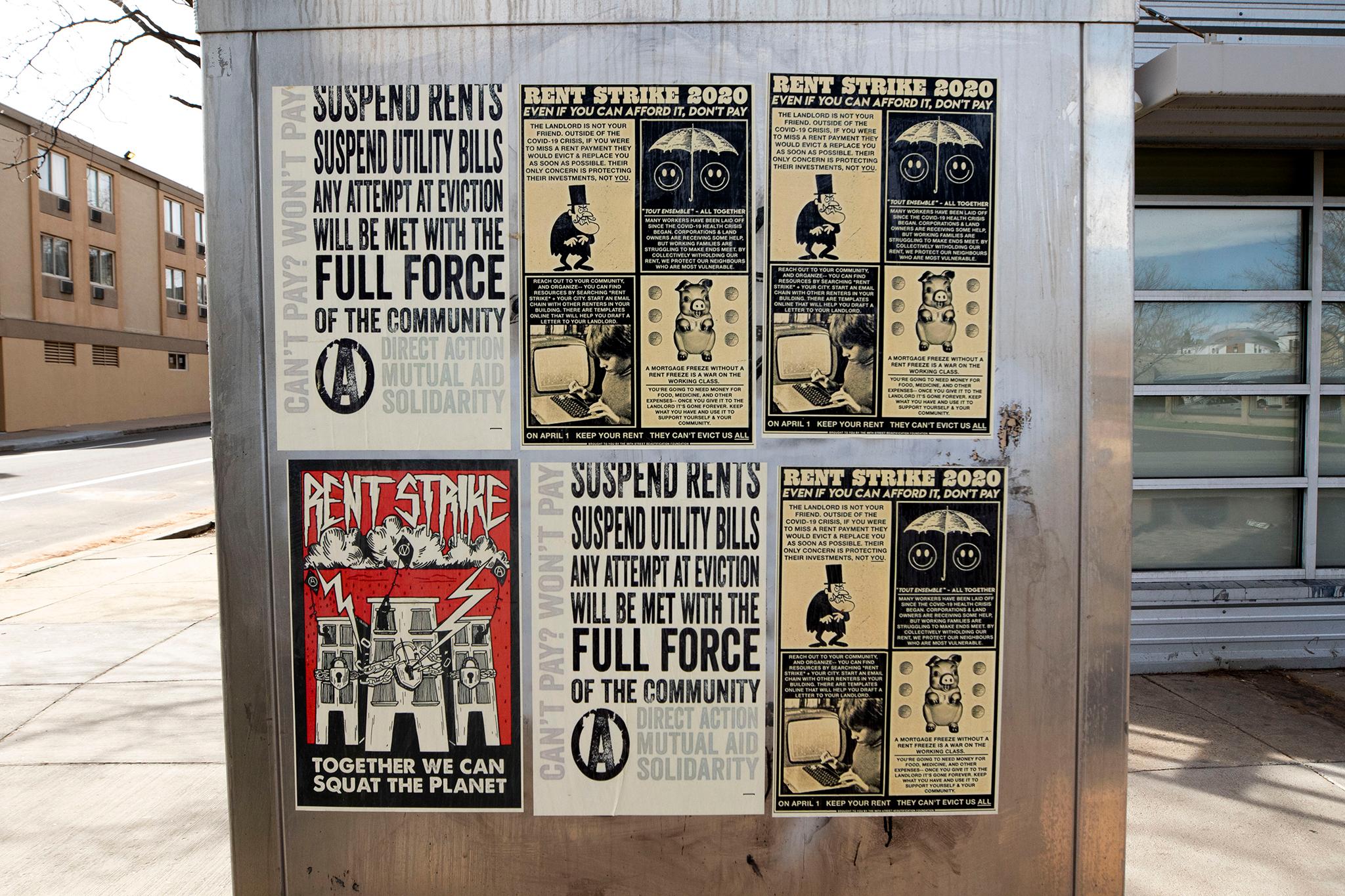Mireya Marquez turned to a tenants' rights lawyer after she became convinced her landlord wanted her out because she couldn't pay her rent.
Marquez's landlord denied he was trying to use means other than eviction to force her out. But texts she saved from him indicate he was pressing her to leave within days after a leak was discovered to have done serious damage at the duplex she had been renting for several years just off Federal in Valverde.
Marquez was able to stay through the end of her lease, which ran through May. She's now staying with a friend and searching for a job and stable housing.
"That is, I think, close to as good as I could do for her," said her attorney, Jason Legg. "But it doesn't feel just or satisfying.
After a temporary statewide ban on evictions expired June 13, Gov. Jared Polis issued an order that allows landlords to begin the eviction process.
While Polis would not institute the statewide eviction moratorium until April 30, Denver Mayor Hancock had in mid-March announced that as part of his response to the economic impact of the coronavirus, his sheriff deputies would stop carrying out evictions for an indefinite amount of time.
But the statewide moratorium and Hancock's decision have not stopped landlords from starting the eviction procedure with court filings. Since March 16, according to city figures, Denver County Court has had more than 200 such cases filed.
Legg and other attorneys and advocates fear that pressure on renters will soon increase, sending some into homelessness.
They point to what happened in Wisconsin when that state's governor-ordered, two-month-old eviction moratorium expired at the end of May. A review of court records by the Milwaukee Journal Sentinel showed eviction filings across Wisconsin were up 42 percent, from 952 to 1,351, compared to the same period in 2019. Some landlords filed eviction suits as soon as the moratorium ended. Some filed the day before it expired.
"I'm very afraid we're going to witness something similar in Colorado," said Jack Regenbogen, a lawyer specializing in housing who is with the Colorado Center on Law and Policy, a nonprofit think tank and advocacy group.

Marquez quit her factory job after hearing that a colleague's husband was ill with COVID-19. She was concerned her employers were not doing enough to protect workers' health.
"I've always paid the rent," Marquez said. "Until now. I think a lot of renters are in the same situation."
To add to the stress of joblessness and worry about the pandemic, Marquez found the leak. She texted her landlord, who called in plumbers. The leak in the bathroom had caused flooding that had done serious damage throughout the structure.
"It was pretty devastating," said Conrad Ippolito, Marquez's landlord.
He said his immediate concern was the possibility of mold and the health hazard it would pose to Marquez and to his tenants in the other half of the duplex. He wanted to get repairs started quickly.
Ippolito said he knew that Colorado law required landlords to provide alternative housing if serious health or safety issues arose in the properties they were renting. He said he initially advised Marquez and the tenants in the adjoining duplex to use their renters insurance to pay for hotel rooms out of concern that his own insurance company could be slow to issue funds. He planned to reimburse them or count anything they spent toward rent, he said.
He said Marquez did not leave and interfered with repairmen. He called the police and was told they could not help. Then he called the fire department to have the water turned off to avoid further damage. He ultimately turned to the city health department for help getting Marquez to move for her own safety, he said.
Marquez said she felt harassed and frightened. She was connected to Legg through 9to5 Colorado, which advocates for working class Coloradans. It was only after speaking to Legg, Ippolito said, that he learned that Marquez believed he would have changed the locks on the duplex if she had left. Ippolito said he told Legg that he would not have done that and knew it would have been illegal.
After Legg's intervention, Marquez moved to a hotel in Highland. Ippolito's insurance company paid for her room there into June, a few weeks after her lease ended. She said she couldn't afford April or May rent. She's had to turn to food pantries to ensure she gets enough to eat.
Tenants who believe their landlords have tried to illegally evict them can sue, but it can be hard to quantify their losses, Legg said.
A half dozen cases of potential illegal evictions have been brought to him since the pandemic broke out. Many more tenants feeling pressure to move may not know how to fight back or be fearful of trying, he said.
Perhaps, Legg said, the moratorium on evictions has prompted some landlords to seek illegal ways to oust tenants who couldn't pay their rent. But he said that the moratorium has helped many more tenants than might have been hurt by illegal eviction attempts, giving them time to work out payment plans with their landlords, find new jobs, apply for unemployment or rent relief or get federal stimulus checks.
He had hoped state lawmakers would give tenants even more time. But the coronavirus-truncated 2020 state legislative session ended earlier this month without assistance for landlords and tenants on proposed measures, such as extending moratoriums on evictions and foreclosures or temporarily banning late fees.
Tony Julianelle, whose Atlas Real Estate manages properties for landlords in Colorado and Arizona, advocated against eviction relief efforts at the Capitol. Atlas's CEO said he was troubled by the length of the moratorium -- which would have lasted until October -- that legislators had proposed. He was also troubled at the idea of denying property owners the legal recourse of eviction when the terms of the lease, a legal contract, are broken.
"It is going to be important at some point to post notices and move residents out of properties that can't pay," he said. "The contract isn't canceled. The rent is still due. And that accrual of debt can be very difficult for some people."
Julianelle said tenants who can't pay the rent can take such steps as moving in with a friend or back home with parents. Many of his clients are landlords with two units or fewer who depend on rent for income and to pay mortgages.
"These aren't wealthy people positioning their assets," he said.
Amid the coronavirus economic slowdown, some property owners have waived rent or worked out payment plans. Atlas hired an employee charged with helping tenants file for unemployment or find rent relief programs, Julianelle said. He portrayed evictions as a last resort.
"An eviction is a horrible reality," he said. "No one wins in an eviction. The owner is not winning. The resident is not winning."
Ippolito said he does not fit the stereotype some might imagine of a "big, bad landlord."
"I grew up in a trailer park and a flooded ranch house and sometimes the back of my car," Ippolito said.
He bought his first rental property 11 years ago, when he was 19 and the country was recovering from the Great Recession. Ippolito now owns six rental properties and manages a few units for others. His tenants are often low-income earners, a group that's been hit especially hard by the economic slowdown.
Ippolito said he was "bracing for the worst," during the pandemic. "I was bracing for everybody to stop paying their rent." He envisioned not being able to make his mortgage payments and losing his properties.
Since the coronavirus hit, "I've been able to help some tenants find jobs when they were laid off," Ippolito said.
He said he has waived rent for some tenants and instituted payments plans for others.

While Colorado legislators did not extend this state's eviction moratorium, they did pass a proposal allocating $19.6 million in federal pandemic relief funds for rent and mortgage assistance (the latter could help landlords) and other measures to keep people housed.
The rent and mortgage assistance bill also allocated $350,000 for the state's eviction legal defense fund, which helps ensure tenants who cannot afford lawyers are represented during eviction proceedings. According to a 2016 study on evictions on which lawyer Regenbogen of the Colorado Center on Law and Policy worked, landlords usually have legal representation in eviction cases in Denver, but tenants almost never do.
Even with the extra $350,000 for the eviction defense fund, "there's just not going to be enough legal assistance," said Shannon MacKenzie, deputy executive director of the Colorado Poverty Law Project.
Colorado has too few lawyers available to help impoverished tenants, said MacKenzie, who expected a sharp increase in evictions filings once the moratorium expired.
"I just can't predict how awful it's going to be," MacKenzie said.
The predicted eviction crisis would be national.
An Urban Institute survey conducted early in the pandemic found that about 14 percent of renters did not make their full rent payment or paid late. Researchers for the Colorado-based COVID-19 Eviction Defense Project estimate that by the end of September, at least 19 million people face eviction across the U.S. because of the coronavirus's impact on the economy. Among them are 420,000 Coloradans.
The pandemic has exacerbated a long-standing housing affordability crisis. The median income for renter households in the United States was $40,500 in 2018, compared to a national median of $63,000. More than 40 percent of renters were cost-burdened, meaning they were spending a third or more of their income on rent. One in four was spending more than half their income on rent.
Zach Neumann, who co-founded the COVID-19 Eviction Defense Project, said that such a widespread problem needs a federal response. Neumann, a lawyer, called on national lawmakers to expand the emergency response to COVID-19 to include rent relief that would be paid directly to landlords.
The report by the Urban Institute noted that the federal Coronavirus Aid, Relief, and Economic Security Act, known as CARES, includes $12 billion for housing and community development programs, and a quarter of that is earmarked for shortfalls in existing federal housing programs. According to another Urban Institute report, after state and federal unemployment assistance expires, $15.5 billion per month would be needed to both help renters who lost income because of the coronavirus and support people who were struggling to pay the rent before the pandemic.
Neumann's COVID-19 Eviction Defense Project worked with the Aspen Institute on a report that noted that the impact of eviction is not felt evenly. Blacks and Latinos -- who have been hard hit by COVID-19 -- have in the past been most likely to be evicted, as are people who are disabled or LGBTQ, were formerly incarcerated, or lack legal immigration status. An Urban Institute survey found that Latino and Black renters were more than twice as likely as white renters to not be able to pay their full rent or pay late in the early weeks of the pandemic.
The Colorado Apartment Association, a landlord industry group, has polled its members and found most received around 95 percent of monthly rent payments in May and June and have been able to cover their mortgages. The association said some smaller housing providers or those with many residents in hard-hit sectors have lower rent payment numbers.
Mark Williams, executive vice president of the Colorado Apartment Association, said in a statement that he expected the payment rates to continue to climb as more Coloradans return to work. The association also cited efforts to help tenants pay the rent, including its own contributions to a rent relief fund. The association brings landlords and lawyers together in regular calls to discuss issues such as the governor's eviction orders.

Daniel Grosso lost his job as a waiter amid the restaurant closures prompted by the coronavirus.
He spoke with the managers of Belmont Buckingham Complex, his Capitol Hill apartment, and worked out a plan to spread out his rent payments. On April 3, the day after he made his first partial payment, an eviction notice appeared on his door. Grosso said apartment managers claimed the notice was a mistake, but he was still shaken. He began to hear of neighbors who were worried about losing their homes.
Belmont is owned by Baron Properties, "a massive company," Grosso said. "Which means they have a ton of resources."
Grosso formed a tenants union. The group met with a lawyer to learn about the eviction process. It also circulated a petition, signed by 41 residents, asking Baron to forgive rent for tenants whose earnings have been affected by the economic slowdown.
Grosso said Baron representatives have refused to meet with his union. Baron did not respond to repeated requests from Denverite for an interview.
A letter signed "Belmont Buckingham Management" emailed to complex residents in response to the petition said the company was unable to reduce rent because its mortgage payments had not decreased and some expenses, such as for cleaning, had increased. But the company said it would continue to waive late fees, work out payment plans, and take other steps in response to the impact of COVID-19. Baron has sent tenants information about how to file for unemployment and where to seek rental assistance and job-hunting tips.
Grosso recently received notice that his lease, which is up in September, would not be renewed. Management gave no reason, he said. Grosso suspects it's because he organized a union.
Two of Grosso's neighbors, Kyle McDaniel and Kira Grush, say they are leaving Belmont Buckingham because of what they see as Baron's lack of responsiveness to the pandemic. The couple, both medical students, are still able to pay their rent thanks to student loans.
"We are in a financial position to stay here. But we won't stay here," Grush said. "I can't watch a corporation trying to benefit off the suffering of people, or at least not trying to help."
Their lease ends in August. They have given notice and plan to move to an apartment owned by an individual, not a corporation.
Legg said he's not sure what kind of impact moves like that of McDaniel and Grush will have. "But I do like to see that solidarity," he said.












